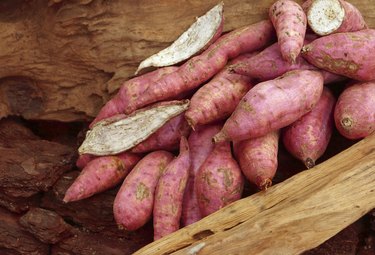
If statistics are an accurate indication, sweet potatoes are widely underrated in the United States. While the average American enjoys regular potatoes enough to consume more than 36 pounds of them each year, sweet potatoes are appreciated to the tune of just over 5 pounds per person per year. The orange-fleshed root vegetable has a lot to offer, however, and is an ideal component of virtually any healthy diet.
Low in Calories
Video of the Day
A medium-sized boiled sweet potato -- or one that weighs right around 5 ounces without its skin, according to the U.S. Department of Agriculture -- provides about 115 calories. It contains nearly 27 grams of carbohydrates, 2 grams of protein and almost no fat. Although sweet potatoes do supply some simple sugars, roughly 70 percent of their carbohydrates are complex, the type that take longer to digest. Because they break down more slowly, complex carbohydrates spend more time in your stomach before being absorbed into your bloodstream. This is why -- even though they're relatively low in calories -- sweet potatoes are such a satiating food.
Video of the Day
Packed With Nutrients
Whether your primary dietary objective is to maintain your body weight, lose extra pounds or simply protect your health, it's important to choose nutrient-dense foods, or those that pack the most vitamins, minerals and beneficial substances into each calorie. Not only are sweet potatoes rich in beta-carotene, but they're also high in vitamin C -- an average-sized specimen that's been peeled and boiled delivers 475 percent and 32 percent of the daily values for vitamins A and C, respectively. It also supplies right around 10 percent each of the daily values for vitamin B-6 and potassium and just under 10 percent each of the daily values for vitamin E, thiamine and iron.
Good Source of Fiber
Sweet potatoes are all the more satiating because they're a good source of dietary fiber -- even without their skins. A medium-sized boiled sweet potato provides close to 4 grams of fiber, or 15 percent of the recommended daily value. The vegetable's flesh is especially rich in insoluble fiber, the type that takes up space in your stomach and helps you feel fuller faster. It also contains a significant amount of soluble fiber, the kind that delays gastric emptying and slows the rate at which simple sugars enter your bloodstream. Unlike regular potatoes, sweet potatoes are considered a diabetes-friendly food that promotes stable blood sugar levels and may help improve insulin sensitivity.
A Healthier Option
While there's no doubt that boiled sweet potatoes are highly nutritious, baked sweet potatoes are generally healthier. Sweet potatoes are traditionally peeled before they're boiled, whereas the baked variety are cooked in their skins. For just a few more calories, a baked sweet potato with skin delivers 25 percent more fiber than one that's been peeled and boiled. The baked variety is also about 20 percent higher in vitamin A, 35 percent higher in vitamin C, 40 percent higher in vitamin B-6, 50 percent higher in iron and 75 percent higher in potassium than its peeled counterpart. Whether you opt to consume the skin or not, however, always eat sweet potatoes with a drizzle of olive oil, a dollop of plain yogurt or another healthy fat, as it helps your body absorb the vegetable's beta-carotene.
- U.S. Census Bureau: Per Capita Utilization of Selected Commercially Produced Fruits and Vegetables: 1980 to 2009
- USDA National Nutrient Database: Sweet Potato, Cooked, Boiled, Without Skin
- USDA National Nutrient Database: Sweet Potato, Cooked, Baked in Skin, Without Salt
- North Carolina Sweet Potatoes: Diabetic Friendly